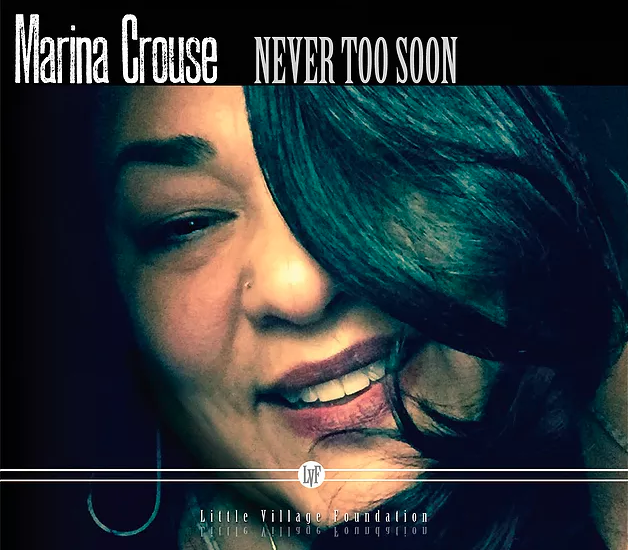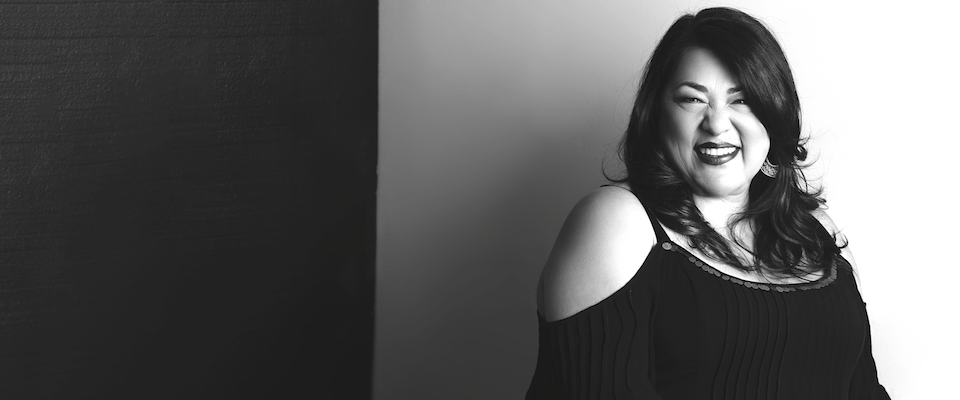UC Berkeley grad and Spanish professor at Diablo Valley College, Marina Crouse has recently found remarkable success in her long-forgone passion for music. With the release last month of her debut album Never Too Soon (Little Village Foundation), the late-blooming singer is starting to earn national attention. And in just a few short years Crouse has become one of the most powerful new voices in the Bay Area music scene.
“I was immediately excited and impressed with her voice, the power, tone, and refinement in terms of pitch,” said Berkeley guitarist Garth Webber, who has toured with the likes of Miles Davis, Bob Weir, and Gregg Allman.
On a whim, Crouse enrolled in a course on blues vocals with blues singer Pamela Rose at the Jazzschool in downtown Berkeley. “You’re really good at this and could really do this if you want,” Rose said.
Part of what distinguishes Crouse is a deeply personal repertoire that reflects her Chicana heritage. In her life, the blues is a rollicking locomotive that pulls a long chain of musical traditions.
“I grew up hearing all kinds of music, blues, mariachi, oldies,” Crouse said. “I was born in 1967, and my mom, who had me young, was a child of the 60s, so I heard all that rock and soul. My grandmother was really into big bands. We didn’t have a lot of musicians in the family, but everybody sang at parties when the liquor was flowing. Blues and soul music were a big part of that fabric and always felt like home to me.”
But it wasn’t until five years ago, with the security of the faculty position at Diablo Valley College and increasingly independent teenage kids, that Crouse, a single mother, decided to start singing again. At first, she had no great ambitions other than to pursue a pleasurable passion.
On a whim, she enrolled in a course on blues vocals with veteran blues singer Pamela Rose at the California Jazz Conservatory’s Jazzschool in downtown Berkeley. After a few classes, Rose approached her with encouragement. “You’re really good at this and could really do this if you want,” Crouse recalled her saying.
Guitarist Danny Caron, Rose’s accompanist, agreed. A well-traveled player who spent years touring and recording with R&B singer and pianist Charles Brown, Caron called to offer Crouse her first gig. “I told him I only know six songs, but he hired me anyways,” she said. For a fairly unexperienced singer, it was no small debut. “He didn’t really tell me at first what it was, but the gig ended up being the Redwood City Blues Festival in 2014.”
Growing up, Crouse didn’t have much in the way of stability. She found refuge in music, and it was the only subject in school in which she applied herself.
That auspicious beginning led to several more performances with Caron, who advised her to decide whether she was serious about singing professionally. Crouse realized that in order to pursue her own repertoire she’d need a band, and her first thought was of Webber whom she’d first met at a Jazzschool blues jam.
“Since then she has learned to sing with a band and has really picked it up quickly,” said Webber. “I am a huge fan, and I love playing with her.”
She credits Webber and keyboardist Tony “Macaroni” Lufrano with helping her develop a repertoire of rarely covered songs, which highlight her unique flavor and distinguish her from the blues pack. On her debut album, she sings renditions of the barrio anthem “The Cisco Kid” and “Sabor a Mi,” a bluesy spin on the bolero that’s a wedding staple. Crouse will celebrate the release of Never Too Soon Sunday, Sept. 16 at San Jose’s Poor House Bistro and Wednesday, Sept. 26 at Redwood City’s Club Fox. On November 9 she will return to the Sound Room in Oakland, the venue that’s served as her home base since the start of her musical journey.
Growing up, Crouse didn’t have much in the way of stability. Moving around California with a single, emotionally distraught mother, she changed schools almost every year and struggled to keep up academically. She found refuge in music, and it was the only subject in school in which she applied herself. But a long backpacking trip through Europe marked by regular encounters with polyglot locals inspired her to start studying Spanish, a language she’d grown up around but never really learned. As a late teen in the mid-1980s, she moved to San Francisco and concentrated on supporting herself. Music fell by the wayside.
At City College of San Francisco, she took a Spanish summer school course and excelled. “It was the first time I ever got an A besides music,” Crouse said. “I kept going and every semester I added a couple classes. I was really motivated.”
Looking to fill educational holes left from her desultory high school career, she enrolled in an English class taught by Joan Wilson, who assigned students to keep a journal about their life. She didn’t have any particular plan and remembered “just kind of taking classes and working as a bartender and waitress at night.” Intimidated by her professor, Crouse sat in the back of the class and never raised her hand. But one day before class, Wilson approached her and asked “Where are you going after here?”

“I told her, oh, I’m going to get lunch,” she recalled. “[Wilson] said, ‘No, not after today—after City College.’” That was something Crouse had never really considered, and so it came as a surprise when Wilson, praising the “beautiful” writing in Crouse’s journal, recommended she transfer, “to Harvard or Yale or Berkeley.”
Crouse started going to Wilson’s office hours, and they plotted her course to Cal. She moved to the East Bay and enrolled as an undergrad in 1993 but couldn’t shake the feeling that she was an imposter whose truth might be exposed at any moment. All that changed once classes started.
“I was amazed at how kind and helpful everyone was, and how at home I felt,” she said. “They had a reentry program and services for transfer students. The best advice I got was to ask for help, make noise. So I got to know everybody—professors, administrators, support staff, everybody.” More than a decade later, Crouse graduated with her bachelors and masters degrees in Hispanic Languages and Literature.
Despite her hard-earned personal success, she’s the first to acknowledge those who have helped her along the way. At every step she’s found invaluable allies, starting with her extended career at Berkeley.
When she became pregnant, the department of Hispanic Languages and Literature rallied around her and hosted a baby shower. Years later, at her Sound Room debut, Crouse looked out into the audience and saw faculty and staff from Cal and Diablo Valley College.
“A lot of them hadn’t known that I’m doing this,” she remembered. “It was amazing to see all these people who’d helped me along the way.”
Andrew Gilbert is a freelance writer who covers jazz, roots, and world music for the San Jose Mercury News, SF Chronicle, JazzTimes, and Berkeleyside, among others.



















